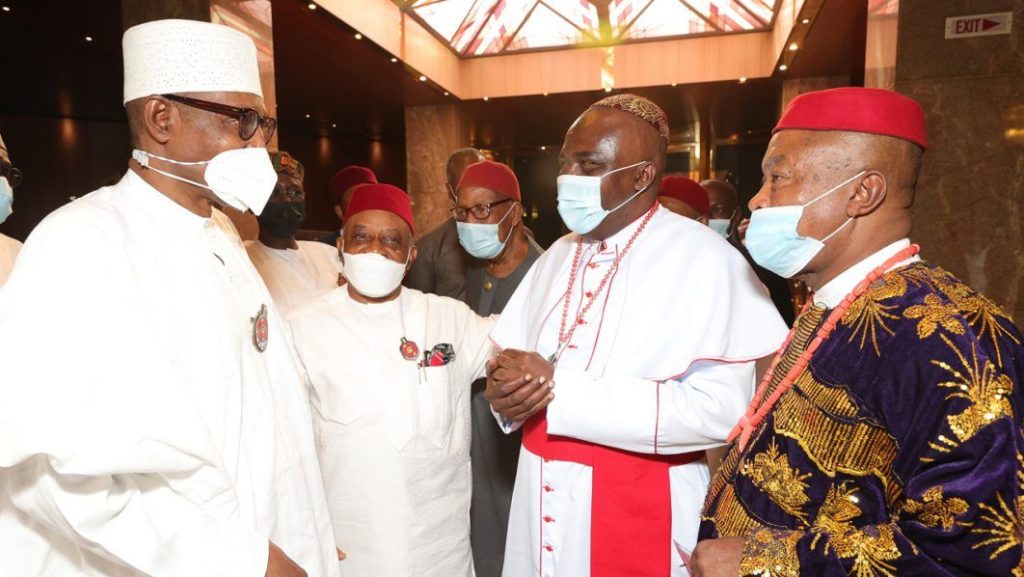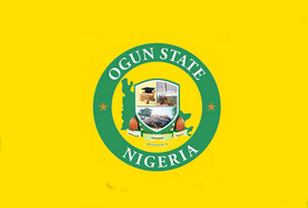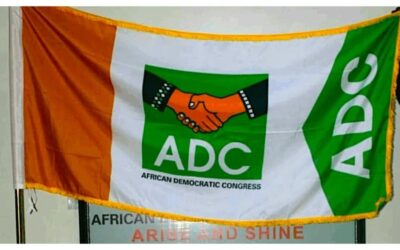Freedom for Nnamdi Kanu: To Be Or Not To Be

On 19 November 2021, notable leaders from the Southeast under the aegis of Highly Respected Igbo Greats met with President Muhammadu Buhari at the Presidential Villa in Abuja. The delegation was led by first republic parliamentarian and former Minister of Aviation; Hon. Mbazulike Amaechi and also had in attendance a former governor of Anambra State, Dr. Chukwuemeka Ezeife, the Co-Chair, Interfaith Dialogue Forum for Peace, Bishop Sunday Onuoha, Mr. Tagbo Amaechi, and Chief Goddy Uwazurike. Also present were the Minister of Labour and Employment, Senator Chris Ngige, the Minister of Science Dr. Ogbonnaya Onu, Minister of Foreign Affairs, Geoffrey Onyeama and Minister of State for Education, Chukwuemeka Nwajuiba. The Chief of Staff to the President, Prof. Ibrahim Gambari, the National Security Adviser, NSA Maj. Gen. Babagana Monguno (retd,) were also present at the audience with the President.
The agenda of the meeting was not unconnected with the security situation in the Southeast with the arrest, detention, and prosecution of the leader of the Indigenous people of Biafra, IPOB, Nnamdi Kanu who is currently standing trial before the Federal High Court, Abuja.
Hon. Amaechi described the situation in the South-East as painful and pathetic, lamenting that businesses have collapsed, education is crumbling, and there is fear everywhere. He pleaded for a political, rather than military solution, requesting that if Kanu was released to him as the only First Republic Minister still alive, “he would no longer say the things he had been saying.” He stressed that he could control him, “not because I have anything to do with IPOB, but because I am highly respected in Igbo land today.” Chief Amaechi said he had interfaced twice with Nnamdi Kanu in the past, and the latter rescinded orders earlier given on civil disobedience. He concluded: “I don’t want to leave this planet without peace returning to my country. I believe in one big, united Nigeria, a force in Africa. Mr President, I want you to be remembered as a person who saw Nigeria burning, and you quenched the fire.”
President Muhammadu Buhari, in his response told the Igbo leaders that the demand was heavy for him but he assured his guests that he will consider their demand. In a statement issued by his Special Adviser on Media and Publicity, Femi Adesina, the President said: “You’ve made an extremely difficult demand on me as leader of this country. The implication of your request is very serious. In the last six years, since I became President, nobody would say I have confronted or interfered in the work of the judiciary. God has spared you, and given you a clear head at this age, with very sharp memory. A lot of people half your age are confused already. But the demand you made is heavy. I will consider it.” Stressing his policy of non-interference with the Judiciary, Buhari said when Kanu jumped bail, got arrested and brought back to the country, “I said the best thing was to subject him to the system. Let him make his case in court, instead of giving very negative impressions of the country from outside. I feel it’s even a favour to give him that opportunity.”
The Attorney General of the Federation, AGF, and Minister of Justice, Abubakar Malami had revealed that exploring political solutions in the Sunday Igboho and Nnamdi Kanu issue is a possibility. The leadership of Ohaneze Ndigbo, the former Deputy President of the Senate, Dr. Ike Ekweremadu, southeast monarchs, and the religious leaders from the zone were among those that have canvassed for a political solution for the IPOB imbroglio.
The surging wave of secessionist movements in the South East and South West Nigeria and its attendant socio-economic drawbacks as witnessed over the past few years forced government to stiffen its stance and eventually apprehend the ringleaders of both movements. Kanu was re-arrested and brought back to custody in Nigeria; while Sunday Igboho is still in detention in neighbouring Benin Republic seeking diplomatic solution. The re-arraignment of Nnamdi Kanu; and the additional charges preferred against him by the Federal Government has further increased the tense situation in the South East with the outlawed IPOB imposing series of “sit-at-home” orders as a mode of rebellion to the legal woes of their leader. The situation witnessed heightened acts of violence and unrest and severe disruptions to economic and political activities alongside a general air of apprehension all over the South East.
The government’s reluctance to be magnanimous towards Kanu is not surprising, given the manner with which he abused the bail privilege given to him in 2017 and instigated domestic rebellion against the state until he was eventually re-arrested. In as such, the government is hanging tighter this time around and is determined to prosecute the case to a logical conclusion. But on the other hand, as the AGF has pointed out, what is paramount to the government is maintaining peace and order, and a political solution is always available to be explored if it will be in the best interest of the nation. The statement served as the motivation that propelled the Igbo leaders to seek an audience with the President and tender the request. This request must have been made in full knowledge of the fact that a political solution is indeed possible under the circumstances as opposed to a strictly legal approach, and that a political solution could expedite a healing and reconciliation cycle.
Read Also: Amnesty for Nnamdi Kanu
Further adding to the legitimacy of the request is that it was initiated and led by persons who are not seeking any immediate political benefit. But can the President grant the amnesty? Yes, and there are precedents in that regard. The President’s powers to grant clemency, otherwise known as the prerogative of mercy, exists under Section 175 (1) of the 1999 Constitution. Section 175 (2) and (3) define how such powers may be exercised. This section of the law was applied to Niger Delta militants by late President Umar Musa Yar’adua who used diplomacy to end the militancy in the oil rich region. The amnesty was however based on a resolution that all hostilities will cease and it was agreed to by all parties involved.
The other ground on which the accused person can be set free is under Section 174 (1-3) of the 1999 Constitution, where the Attorney General of the Federation can intervene in any proceedings in any court of law in Nigeria other than a court-martial, with regard to any offence at all, and either take over the case or discontinue it through the instrumentality of a nolle prosequi. The AGF is required to do so however, in person or by proxy, with “regard to the public interest, the interest of justice and the need to prevent the abuse of legal process.” Further, the Constitution grants the Attorney General full and express authority here, without recourse to the President but because the offices of the AGF and that of the Minister of Justice are combined under our jurisdiction, the AGF is not just a Chief Legal Officer of the Federation, he is also a political appointee, a cabinet minister, in his capacity as a minister of Justice. Hence, he hardly acts independently, without the approval of the President. In effect, under both Sections 174 and 175 of the 1999 Constitution, the executive arm of government can free or grant amnesty to any accused or convicted person, before, during or after a trial. The argument that this would amount to a violation of the doctrine of the separation of powers subsists and there may be other issues of concern that define the President’s circumstances.
Chief Amaechi disclosed that if Kanu is released based on his request, he would leverage his respectable status to put a leash on him and ensure he no longer incites violence or hostile agitation on the Nigerian state. This is a personal statement of guarantee by the sage for the IPOB leader; words of a distinguished nonagenarian who has decided to use his hard-earned goodwill to stand as surety for Kanu all in a bid to bring peace and order back to the South East which is is indeed a courageous act of leadership and selflessness. But alternately, it is well documented that Kanu and his IPOB disciples hardly listen to their elders or treat them with the required respect; when IPOB put in motion its reckless sit-at-home directive every Monday to protest Kanu’s re-arrest, Ohanaeze Ndigbo, the apex socio-cultural group in Igboland and many other Igbo elders made several appeals to the group to jettison the idea but the group was recalcitrant and defiant in its disrespect of such entreaties, its disrespect and scorn for Igbo elders is blatant and undisguised.
There is no assurance that Chief Amaechi and his entourage consulted with Kanu and his IPOB followers to secure their repentance and readiness to eschew violent demonstration and toe the path of total peace and dialogue with their grievances. What is the proof that once he is released, Kanu will not revert to his ignoble act and engage in anti-state activities again? As weighty and honourable as Chief Amaechi’s guarantee is; it could be insufficient to sanction a presidential amnesty of this magnitude.
Before now, some Igbo elders have advised IPOB and members of the Eastern Security Network (ESN) to moderate the tone of their self-determination demands, the request all fell on deaf ears. Even when IPOB came forward to announce that it had vacated the same order, the people stubbornly refused to follow IPOB’s lead because other forces beyond IPOB’s immediate control had hijacked the cause as an avenue for troublemaking and social disorder. Till today, the stay at home on Mondays is still in place to varying degrees. IPOB is a more powerful force in the South-East today than any state government. Many Igbo families have stopped going home out of fear. Will the release of Nnamdi Kanu douse tension? That is in the affirmative, but there is more to it. There are many youth groups and stakeholders who are arguing that Nnamdi Kanu has not committed any offence. They have derided the elderly delegation for going to the President to “beg” and they claim they don’t want any sympathy from the Federal Government but instead an apology based on the manner Kanu was apprehended and that Ndigbo should not go to appeal for anything. They believe that since murderous Boko haram insurgents who now claim repentant are being pardoned and absorbed back into the society with little hesitation, why is Kanu’s case generating such hostile reception from other interest groups? Such line of thought still abound in the South-east, merely letting Kanu go without streamlining all such warring stakeholder interests from the region may be an unmitigated disaster.
Read Also: IPOB: Grinding Down the South-East Economy
On the national outlook, there has already been stiff resistance to the appeal and the President’s statement of consideration by some groups, notably the Northern Elders Forum and Coalition of Northern Groups; who maintained that granting such a request will be a bad precedent for the President; as he will be directly interfering in a judicial process. They enumerated the various acts of destruction and mayhem the IPOB group has been involved in under the command of Kanu and concluded that allowing him to be released without suffering the consequences may send the wrong signal to other lawbreakers that anti-state actions are condonable. The President’s potential approach may also be influenced by the realisation that the issue of Presidential pardon and amnesty has become far more complicated in Nigeria today than when it first became popular in the early part of the century. The response by the President to consider the request was one based on diplomacy and respect for the visiting delegation rather than one based on the merit of the appeal.
Further complicating the situation is the fact that Nnamdi Kanu violated the terms of the bail previously granted to him few years ago. From all indications, he is unwilling to change strategy or abandon his self-acclaimed struggle, if released today without a binding commitment on his part to immediately halt the violent separatism; the Nigerian state may indeed regret the ill-thought decision. For anyone to be considered for amnesty, the first pre-requisite must be a non-negotiable commitment on the part of the detainee to forsake the old ways that led to his arrest in the first place; any other condition may be inappropriate for amnesty. Nnamdi Kanu is yet to admit to the gravity of his actions; let alone ready to turn a new leaf. The situation is complex and not as simple as it is being presented to be. Granting a blanket amnesty is not as straight-forward as it sounds, the consequences could be multi-faceted.
The dilemma is indeed tricky, so what should President Buhari do? The circumstance is a clear example of where the theories of consequential or non-consequential ethics come into play. Under this present scenario, it behoves on him to make a decision that will have the best consequence or least-worst consequences for Nigeria at large. He was elected President to make these kind of decisions and Nigerians must trust his judgment as a leader.
Will he grant blanket amnesty to Nnamdi Kanu and Sunday Igboho alongside their followers and collaborators in different parts of the country to pave the way for dialogue, healing, reconciliation and justice? It is advisable to explore any option that will heal the fractured nation and smother the embers of division currently burning menacingly, it is also pertinent to critically assess what the impact of such decisions will have on the psyche of the nation as a whole, its implications based on the law, interpretation it could be given across board and its effect on the armed forces who have been on the frontline of the battle to maintain the nation’s authority and contain destructive acts of non-state actors who are on a mission to sabotage the corporate existence of the country. There is also the issue of independence of the judiciary to contend with; although it could be argued that national interest supersedes separation of powers in instances such as this.
The President would look into the matter as promised and he would certainly consider the downsides and upsides to the situation as a whole. Concerned interests can only hope that President Buhari would indeed do so. Their counterparts in the South west would also be keenly watching as they have one of their own locked in a similar situation in Benin republic that requires immediate political diplomacy.


